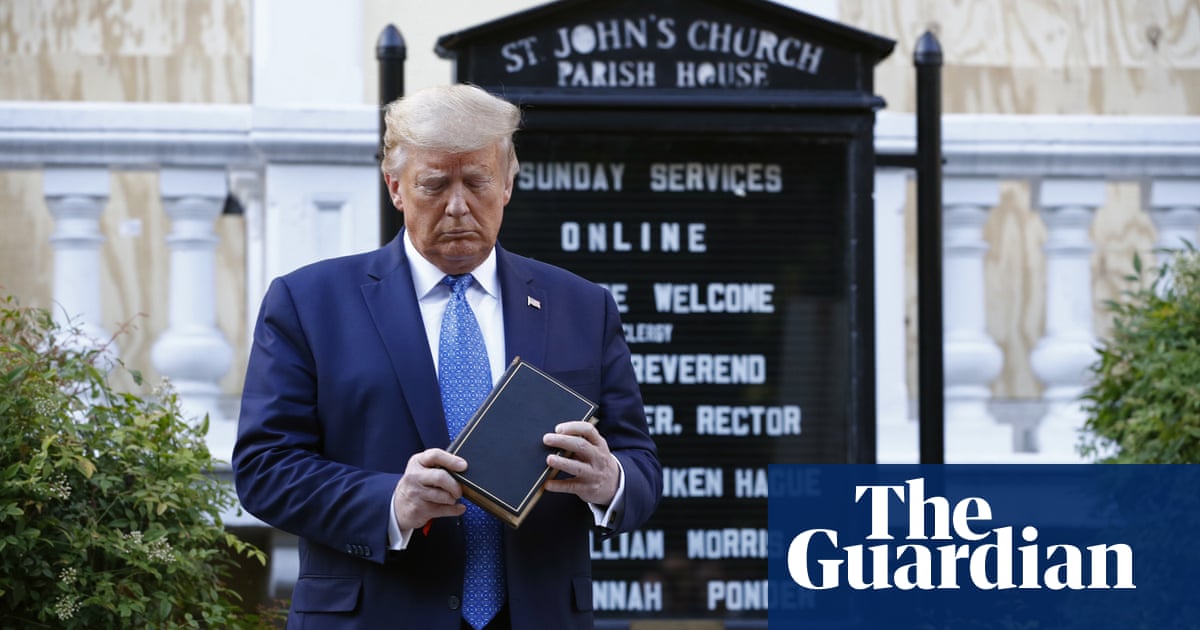
Pulitzer-winner David Rohde dismisses the Deep State theory – but also shows government does pursue entrenched interests
The 2016 election left the US gaping at a brewing battle between the president-elect and the most senior members of the law enforcement and intelligence communities.
Into the conflagration jumped Virgil, a pseudonymous contributor to Breitbart, who wrote of a “deep state” within the US government, bolstered by the mainstream media and a “galaxy of contractors, profiteers, supporters”, all purportedly intent on destroying Donald Trump.
His near-4,000 word essay appeared weeks before the FBI director, James Comey, briefed the president-elect about the Steele dossier, on 5 January 2017, before 11 January when Trump compared America’s intelligence agencies to Adolf Hitler’s Gestapo. For Trump and his minions, Virgil’s take became a touchstone.
Enter the New Yorker’s David Rohde. Under the subtitle “The FBI, the CIA, and the Truth About America’s ‘Deep State’”, the two-time Pulitzer-winner rejects the nomenclature of conspiracy theorists. In doing so he relies in part on Will Hurd, a moderate Republican congressman from Texas who served overseas with the CIA, opposed impeachment and is not seeking re-election.
But Rohde does little to dispel the notion that government is riddled with entrenched interests, and that career officials can find themselves at odds with incumbent presidents and vice versa. In Rohde’s view, civil servants are part of “‘institutional government’”, a relatively benign term that masks turf fights, budget battles, policy skirmishes, built-in biases and well-formed points of view. The left has frequently derided the military industrial complex. Name-calling plays both ways.
Rohde acknowledges that “all countries have permanent governments”, but says the US imposes greater political control over its employees and the resultant process. Even so, campaign finance records reflect that the federal bureaucracy is not a Republican bastion.
Going back in time, in 2012 Internal Revenue Service employees donated to Barack Obama over Mitt Romney by a 4–1 ratio while lawyers at the National Labor Relations Board and the education department shut out Romney completely. In 2020, Joe Biden is outpacing Trump at the IRS and the justice department, as Hillary Clinton did in 2016.
Of course, who joins the federal government is not necessarily in sync with who prevails on election day. But the Trump presidency appears unique and disheartening. The fight between the president and law enforcement and intelligence was an avoidable consequence of Russia’s “active measures” in support of the Trump campaign, and a candidate all too willing to accept the sordid bounty.
“I love WikiLeaks” was bound to gain attention. And as Rohde makes clear, Trump has waged a persistent assault upon the rule of law, the ideal of a justice department removed from politics and the concept of an intelligence community loyal to the country rather than the man in the Oval Office.
A recent Senate intelligence committee report observed that the intelligence community has “present[ed] a coherent and well-constructed intelligence basis for the case of unprecedented Russian interference in the 2016 US presidential election”. As Robert Mueller reminded us, absence of indictment was not akin to prosecutorial absolution, despite what the attorney general, William Barr, may have thought and said.
On that score, in an opinion issued last month Reggie Walton, a George W Bush appointee to the federal bench, “seriously” questioned Barr’s integrity and credibility, using words like “distorted” and “misleading” to drive the point home.
Suffice to say, all this is coming with a steep cost to our democracy and our post-Watergate system, which sought to make law enforcement something other than the handmaiden of the White House. Trump placing his hand on the shoulder of an FBI director and whispering into his ear is the stuff of Martin Scorsese’s films. “Lock her up” is chant befitting a democracy in decay – or worse.
Rohde, however, reminds us that Trump’s predecessor was by no means angelic when it came to encroachment on civil liberties, despite stints on the Harvard Law Review and as a professor of constitutional law at the University of Chicago. Under Obama the Pentagon regarded leaking non-classified information as “tantamount to aiding the enemies of the United States”.
Rohde recalls how the intelligence community under Obama spied on a Senate committee, misled Congress about spying on Americans and expanded the use of drone warfare. He offers granular detail on how James Clapper, Obama’s director of national intelligence, obfuscated before the Senate intelligence committee on data collection and surveillance of US citizens.
Years later, Clapper would accuse Trump and his administration of an “assault on truth” and posit that Trump might be a “witting or unwitting” Russian asset. Regardless of the validity of the charges, Rohde voices discomfort with intelligence community alumni playing an outsized role in clashes with the administration.
In Deep also pays attention to the Trump administration’s privatization of foreign policy. Among other things, Rohde describes at length how the efforts in Ukraine of Trump’s personal lawyer, Rudy Giuliani, helped lead to Trump’s impeachment. Not surprisingly, Republican stalwarts have failed to thunder paroxysms of outrage over this dubious practice as they do over the supposed deep state.
As Rohde repeatedly reminds us, negative partisanship increasingly drives our politics. With social chasms underlying most of the divide, don’t expect it to disappear anytime soon. In our cold civil war, elections have morphed into safety valves and battlefields. Wisconsin’s potentially lethal conflict over mail-in ballots is just the latest reminder.
In assessing the existence of a deep state, or otherwise, it is worth remembering what Steve Bannon had to say about it – the same Steve Bannon who skippered Trump’s upset victory and signed Virgil’s paycheck back in his Breitbart days. As Bannon admitted to James Stewart of the New York Times, the “deep state conspiracy theory is for nut cases”, because “America isn’t Turkey or Egypt”.
True enough, but our freedom and trust continue to erode with no end in sight.












